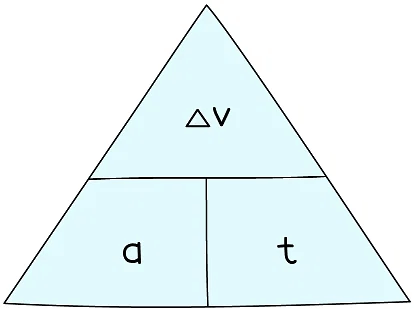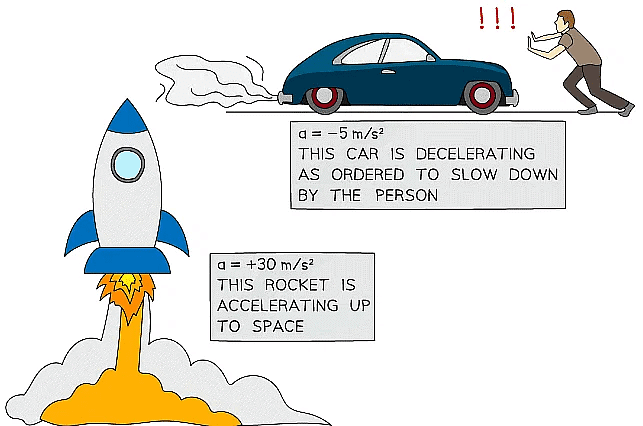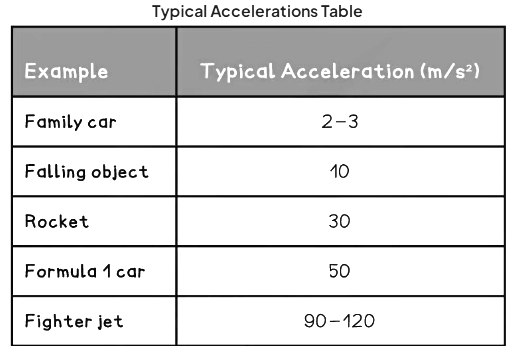Acceleration | Physics for Grade 10 PDF Download
| Table of contents |

|
| Defining Acceleration |

|
| Speeding Up and Slowing Down |

|
| Solved Example |

|
| Estimating Accelerations |

|
Defining Acceleration
- Acceleration is defined as the rate of change of velocity
- In other words, it describes how much an object's velocity changes every second
- The equation below is used to calculate the average acceleration of an object:


- Where:
- a = acceleration in metres per second squared (m/s2)
- Δv = change in velocity in metres per second (m/s)
- t = time taken in seconds (s)
- The change in velocity is found by the difference between the initial and final velocity, as written below:
change in velocity = final velocity − initial velocity The equation for acceleration can be rearranged with the help of a formula triangle as shown:

Speeding Up and Slowing Down
- An object that speeds up is accelerating
- An object that slows down is decelerating
- The acceleration of an object can be positive or negative, depending on whether the object is speeding up or slowing down
- If an object is speeding up, its acceleration is positive
- If an object is slowing down, its acceleration is negative (sometimes called deceleration)
- Two examples of accelerating and decelerating objects are shown in the image below
 A rocket speeding up (accelerating) and a car slowing down (decelerating)
A rocket speeding up (accelerating) and a car slowing down (decelerating)
Solved Example
Example: A Japanese bullet train decelerates at a constant rate in a straight line.The velocity of the train decreases from 50 m/s to 42 m/s in 30 seconds.
(a) Calculate the change in velocity of the train.
(b) Calculate the deceleration of the train, and explain how your answer shows the train is slowing down.
Part (a)
Step 1: List the known quantities
Initial velocity = 50 m/s
Final velocity = 42 m/sStep 2: Write the relevant equation
change in velocity = final velocity − initial velocityStep 3: Substitute values for final and initial velocity
change in velocity = 42 − 50 = −8 m/sPart (b)
Step 1: List the known quantities
Change in velocity, Δv = − 8 m/s
Time taken, t = 30 sStep 2: Write the relevant equation
Step 3: Substitute the values for change in velocity and time
a = −8 ÷ 30 = −0.27 m/s
Step 4: Interpret the value for deceleration
The answer is negative, which indicates the train is slowing downExam Tips: Remember the units for acceleration are metres per second squared, m/s2
In other words, acceleration measures how much the velocity (in m/s) changes every second, m/s/s.
Estimating Accelerations
- The acceleration of an object is a measure of how quickly its velocity changes
- A typical family car, for example, takes around 10 seconds to go from 0 m/s to 27 m/s (roughly 60 mph)
- This is an acceleration of about 2.7 m/s2
- The table below gives some other typical accelerations:

Exam Tip: You should be able to estimate the magnitude of everyday accelerations. Memorise the examples given in the table to develop a sense of the magnitude of different accelerating objects.
|
122 videos|150 docs|40 tests
|















